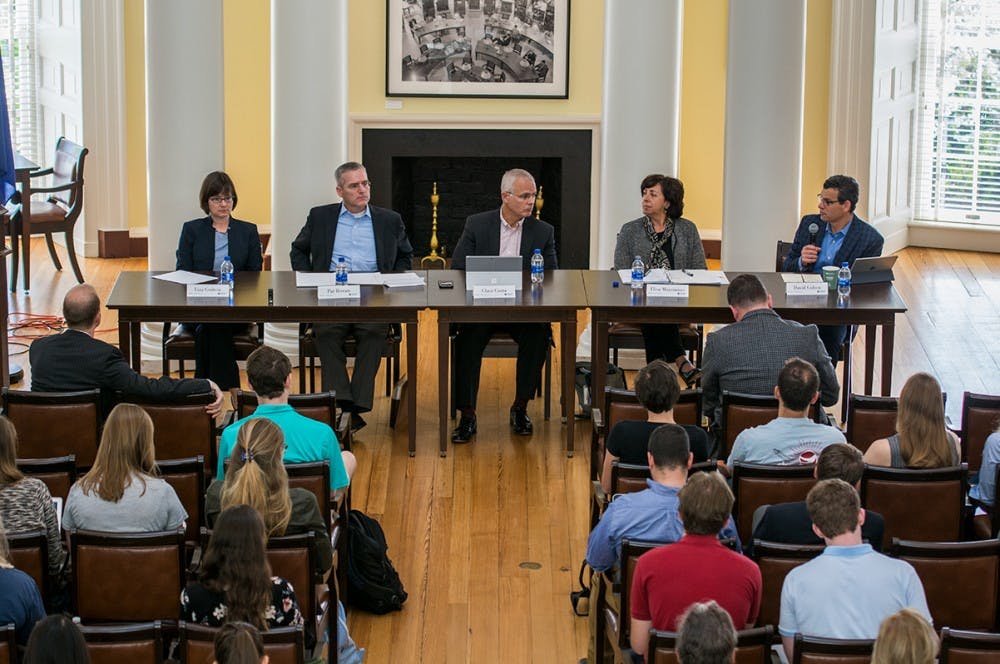The National Security Policy Center of the Batten school hosted a panel Thursday made up of current and former military and administrative officials to discuss contemporary issues in counterterrorism, including surveillance, detention and prosecution.
During the discussion of detention and subsequently torture of war criminals and detainees overseas, Elisa Massimino, president and chief executive officer at Human Rights First, brought up the appointment of Gina Haspel by President Donald Trump’s administration to director of the Central Intelligence Agency.
Haspel previously oversaw the CIA’s first overseas detention site in Thailand where detainees were waterboarded and tortured. Haspel was even threatened to be fired after it was found that she destroyed video evidence of these torture sessions.
“Very few people have been tried for the conduct of torture,” Massimino said. “And there are good reasons for that, actually. But when there’s the opportunity whether or not to promote somebody who was intimately involved in the torture program, that’s a chance for us to declare where we stand on this issue. And while much of the record on Gina Haspel remains classified, the undisputed public reports have her overseeing serious forms of torture going on. And she was involved in the decision-making process of destroying the videotaped evidence…”
Massimino added that it would be harmful for the country to promote Haspel, given her record on torture.
“It would be incredibly damaging both to our ability to turn the page as a country on this issue, and for people inside government to re-write lessons if she were to be elevated to the head of the CIA regardless of how otherwise her record may be stellar,” Massimino said.
Contemporary issues in detention made up the bulk of the panels’ discussion, including the looming presence of Guantanamo Bay which J. Patrick Rowan, former Assistant Attorney General for National Security in the Department of Justice, called a “slow moving trainwreck.”
Rowan introduced the case of five particular individuals the U.S. government believes organized the 9/11 terrorist attacks.
“It’s really quite awful to me. If we consider that five conspirators that lead a plot that are down at [Guantanamo Bay] … who are widely understood to have organized a planned attack … they’ve been in U.S. custody since 2003 and sitting in there since 2007,” Rowan said. “They haven’t gone to trial… it’s a terrible, terrible, tragedy that their cases haven’t been resolved.”
Established in 2002, Guantanamo Bay was meant to hold detainees in order to prosecute them for allegations of terrorism. Many of those individuals originally detained are still in custody.
However, hearing their cases is a complicated and problematic process as there are numerous potential consequences of releasing them. Many could face exile from their home countries for being labelled war criminals by the United States, and sometimes there is no evidence to present.
Elizabeth Goitein, co-Director of the Liberty and National Security Program at the Brennan Center, said evidence itself is an equally complicated topic in the digital age.
“We don’t actually have a special set of surveillance rules for terrorists,” Goitein said. “Instead, we just have the laws and the policies for domestic surveillance on the one hand and intelligence surveillance on the other. And these are the tools that we use to conduct surveillance on people suspected of ordinary crimes as well as terrorists”
These laws and policies include taking information from databases stored outside of the U.S. and using the information taken from those as evidence in criminal charges, even when this evidence is not willingly given. Evidence stored by a third party — emails through Google, for example — or evidence stored outside of the U.S. is all open for the government to use, and is considered willingly given.







